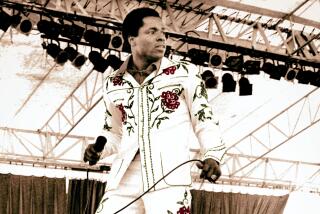There’s more to Jolson story
- Share via
Don Shirley’s commentary on Al Jolson’s life and career simply flies in the face of facts (“Let Sleeping Eras and Their Stars Lie,” May 15). He left out significant components of Jolson’s successful 40-year show-business career. A lion’s share of the Jolson legacy would have to go to the recordings he left behind. Jolson was the hit maker of his day and introduced numerous standards, including “Rockabye Your Baby With a Dixie Melody,” “You Made Me Love You,” “April Showers” and “California, Here I Come.” Jolson’s film and radio career didn’t thrive during the ‘30s, but his popularity was comparable to Michael Jackson’s fame today as opposed to when his 1983 “Thriller” album was released.
The big problem with Shirley’s commentary is that he fails to mention the greatest aspect of Jolson’s career: the bio-pic “The Jolson Story,” was one of the blockbusters hits of its day (1946), engineering what was then considered the greatest comeback in theatrical history. Jolson’s prime-time radio show, “The Kraft Music Hall,” was the No. 1 show on the air in 1947. That same year Jolson was voted No. 1 Male Singer on the Air (he was 61) in a field that included Bing Crosby, Frank Sinatra and Perry Como.
Jolson was hugely popular at the time of his passing, as evidenced by the fact that the Los Angeles Times published an extra-edition banner headline the morning after his death in San Francisco (Oct. 24, 1950).
Douglas Galloway
Monterey Park
*
My father, Eddie Cantor, wore blackface in the tradition of the comics and song-and-dance men of his day because, for one thing, most performers traveled constantly and could appear in many more cities as “fresh” if their faces were not familiar. As an old vaudeville performer commented in a recent documentary, the exaggerated look of the black face with the prominent white lips also made it easier for the audience to understand the words, since shows were certainly not miked in those days. My father’s closest friend and mentor, Bert Williams, was a light-skinned black man who also “blackened up” for every performance.
I was too young to have seen Jolson on the stage, but my father and mother said his Sunday nights at the Winter Garden were sheer magic. While my father went on to become No. 1 in movies for three years running, I think the reason Jolson didn’t make the transition was because the camera picked up on the difference in their personalities, which couldn’t be detected from the stage. Jolson’s ego was so enormous that he played to his audience, while my father basically had a love for people that Jolson did not share. He played for an audience, and that’s what came across. I sincerely believe that none of my father’s black friends had any resentment toward him for wearing blackface, inasmuch as he was a fierce fighter for civil rights long before those words were being emphasized. As for the sometimes silly or contrived plots of the old musicals, it’s interesting to note that the most popular shows on Broadway are revivals. With the cost of producing a show as huge as it is, no one wants to take a chance on anything new, and if there is something new, it better be a spectacle, because the tourists paying the outrageous ticket prices want their money’s worth.
Janet Gari
New York City


